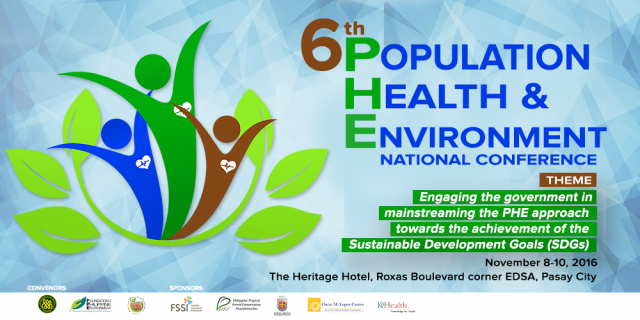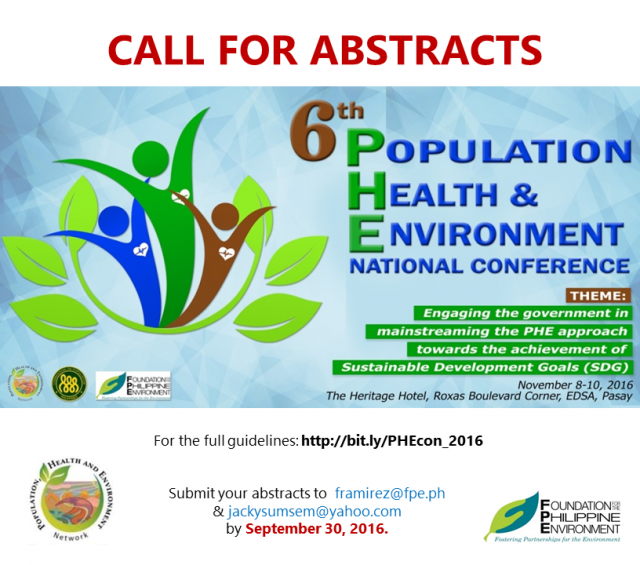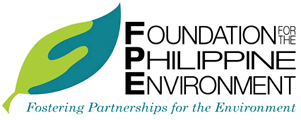News
The 6th National PHE Conference; Extended Call for Abstracts
Posted on July 31, 2016The 6th National Conference on Population, Health and Environment (PHE) will be held on November 8-10, 2016, at the Heritage Hotel, Pasay City, Manila.
The Population-Health-Environment (PHE) approach to development recognizes the crucial link between people and their environment. Integrated population, health and environment programs have shown better results than single-sector programs and are more programmatically efficient. The National Population, Health and Environment (PHE) Network invites you to submit an abstract that share learnings on how the Sustainable Development Goals (SDGs) are being addressed, as guided by the integrated PHE approach, for the upcoming 6th National PHE Conference.
The conference theme for this year is, "Engaging the Government in Mainstreaming the PHE Approach Towards the Achievement of Sustainable Development Goals (SDGs)". Through the 6th National PHE Conference, the PHE Network and partners aim to advance achievements in intensifying, replicating and expanding the the PHE programmatic approach to different landscapes (urban and rural settings; from a community to an ecosystem approach); across varying landscapes such as aquatic, upland and urban areas; and others; and to different strategic points of intervention (climate change actions, disaster mitigation, poverty alleviation, food security, HIV-AIDS programming, improved technology and sustainable energy-supported, and others). The gathering will explore the successes and challenges of addressing the SDGs and craft an advocacy plan to have the PHE approach mainstreamed in the Philippine Development Plan.
The conference and call for abstracts are open to public and private PHE practitioners, members of the academe, government officials, local government executives, international organizations/ development partners, non-government organizations, people’s organizations and other civil society organizations.

Mainstreaming the PHE approach means including its priority concerns, strategies and tools in the new Philippine Development Plan to ensure healthy people living in a healthy environment in the country’s pursuit of the SDGs.
The conference will explore dimensions of sustaining and increasing the impact of integrated population, health and environment initiatives to address development priorities – such as poverty reduction, improved health, livelihood, disaster mitigation, food security, and natural resource management.
The 6th National PHE Conference, specifically, aims to present the current state, issues and challenges of PHE; familiarize and update PHE members on the status of planning to fulfill the SDGs; draw up the PHE advocacy plan to engage the government and other stakeholders; and dentify roles and engagement mechanisms of PHE practitioners in advancing the PHE agenda in the New Philippine Development Plan within the context of SDGs.
Plenary sessions shall take the following tracks:
- Track One addresses PHE issues and challenges in the SDGs era with papers on the people, environment and economic concerns.
- Track Two covers roles and engagement mechanisms of PHE practitioners in advancing the PHE agenda, with views from government (national, local and legislative branch), grassroots communities, youth and women, civil society organizations, development partners, academe and research partners.
- Track Three is on PHE as a tool to achieve specific SDGs, with papers on education, values and knowledge products; food production and access; water consumption and sanitation; poverty and social equity; healthy lives and human wellbeing; climate change; sustainable energy; aquatic and terrestrial ecosystems; sustainable cities and human settlements; and gender equality and women empowerment
- Track Four sessions addresses partnership, accountability and sustainability concerns over topics that tackle financing and resource mobilization; monitoring and accountability; governance; CSO participation; role of technology and innovation; communicating PHE through the SDGs; research; partnership and the role of the private sector (PPP); and capacity building.
Parallel sessions shall cover the PHE strategies and tools being used to achieve the SDGs, specifically:
- PHE issues and challenges in the SDGs Era
- Roles and engagement mechanisms of PHE practitioners in advancing the PHE agenda
- Applying PHE as a tool to achieve specific SDGs
- Partnership, accountability and sustainability
Join us in interesting sharing of learnings from project experiences, advocacy plans and networking opportunities.
Conference Registration
Registration is now open. Deadline for early bird registration (with 10% discount) is on 8 October 2016.
|
Conference Packages |
Local Participants (Php) |
Foreign Participants ($) |
||||
|
Regular |
Early bird |
Presenter |
Regular |
Early bird |
||
|
1 |
Food and conference kit |
P 6,500 |
P 6000 |
P 3,500 |
$ 200 |
$ 160 |
|
2 |
Single accommodation with food and kit |
P 19,000 |
P 17,500 |
|
$450
|
$ 400 |
|
3 |
Twin sharing accommodation with food and kit |
P 13,000 |
P 12,000 |
|
$ 320 |
$ 300 |
|
4 |
Triple sharing accommodation with food and kit |
P 13,000 |
P 11,500 |
|
$ 310 |
$ 280 |
For Conference details, contact:
Fernando M. Ramirez, framirez@fpe.ph
For Conference registration, contact:
Leonora Dominguez, ldominguez@fpe.ph
CALL FOR ABSTRACTS
Submission Guidelines for Abstracts (The guidelines can also be downloaded here.)

Each abstract submission must include the contact information for the presenter, the abstract text, and a brief narrative biography of the presenter.
- A presenter may submit only one abstract for consideration.
- Only one author can be listed as the presenter. Co-authors are welcome to attend the session, but cannot be featured as a presenter.
- All abstracts must be submitted and presented in English.
- All abstracts must be limited to 450 words. Please use Times New Roman 12 font. Handwritten abstracts and paper copies will not be accepted. The title and designated presenter are not included in the word count. Headings within the abstract are included in the word count. Any abstract longer than 450 words will be returned.
- Acronyms and abbreviations should be spelled out at first use.
- All abstracts must be submitted electronically. Conference Secretariat must receive your abstract no later than 30 September 2016.
Criteria for Selection:
Abstracts will be judged based on their direct relevance to the conference theme of how the PHE approach may be mainstreamed in the Philippine Development Plan under the new leadership to support the attainment of SDGs commitments of the government.
In addition, abstracts should highlight new lessons and innovative ideas, along with the ability to share lessons for replication of integrated models. Authors may include any of, but are not limited to, the following keywords referring to the PHE dimensions and models through which the SDGs are being addressed, e.g., in issues like universal health care, health care resilience and disaster, RH-maternal health, climate change, environment (water and ecosystems), renewable energy, emerging threats and existing vulnerabilities, poverty and hunger reduction, food security and sustainable agriculture, sustainable livelihood and enterprise, how PHE tools are effective in addressing these issues, and aspects in partnerships and good governance.
Guidelines for Abstract Contents:
Please follow these guidelines for the content and flow of your abstract and present it in a brief or summarized format:
- Abstract Title: How does your study, program or initiative demonstrate addressing the SDGs (either in response to the state of the global goals, as actions in climate change adaptation and disaster risk and rehabilitation (CCA-DRR), or by demonstrating how the PHE approach may be mainstreamed in the Philippine Development Plan)?
- Presenter and co-authors/partners: Who was involved in your study, program, or activity? Is the primary person involved the one who will make the presentation if the abstract is accepted? Who assisted in the study or program?
- Learning Objective: What will participants learn as a result of attending this presentation? An example of a learning objective is: Participants will be able to explain a model for a NGO - local government partnership and key steps in climate change adaptation and disaster risk reduction.
- Background: What was the purpose of your study, program, or campaign? What were the key objectives? When and where did it take place? How long did it last? How many people were involved in the study, program or policy initiative? How much did it cost?
- Design/Methods: How was your study, program, or initiative conducted or implemented?
- Examples for your study/program: How were the data collected and analyzed? (Cite methods used.)
- Results/Outcome or Current Efforts and Implications: What are the results or outcomes of your study, program or initiative? What is the outcome of addressing any of the SDGs? What population, health or environment improvements have been made? What have been additional documented benefits (such as better community cohesion, greater outcomes for initial capital investments, or increased livelihood opportunities)?
- Conclusions: What have we learned from the study or program that merits further action or will be useful for replication in other studies/programs/campaigns? What are the implications and conclusions as indicated by the data? What is the potential applicability or replication in other settings, particularly for a country like the Philippines?
Review and Notification:
Your abstract will be submitted to a review committee. The conference organizers will notify you whether your abstract has been accepted before September 30, 2016. The earlier abstracts are submitted, the better, as organizers need time to review the abstracts. If you abstract is accepted for presentation, you will be required to confirm your participation and register for the conference by September 30, 2016.
Send your abstracts and inquiries to the following conference hosts:
|
JACKYLIN D. ROBEL Planning Officer V Commission on Population Acacia Lane Ext., Welfareville Compound, Brgy. Addition Hills, Mandaluyong City Email: jackysumsem@yahoo.com Tel.: (+63 2) 531-7303 Fax No.: (+63 2) 531-5122 |
FERNANDO M. RAMIREZ Manager, Program Development Unit Foundation for the Philippine Environment #77 Matahimik St., Teachers’ Village Quezon City 1101 Philippines Email: framirez@fpe.ph Tel.: (+63 2) 926-9629/ 927-2186/ 927-9403 Fax No.: (+63 2) 922-3022 |
Read More:
- Executive Director Dr. Jerome L. Montemayor carried the banner of the Foundation for the Philippine Environment and the larger civil society during the SBSTTA 26 and SBI 4 meetings in Kenya
- Call for Proposals for the SGP-8 Country Programme Strategy
- #Y4B Ambassadors: JOEPET JEROME S. JARO
- #Y4B Ambassadors: MELLARD MANOGURA
- #Y4B Ambassadors: MARY JANE P. MAGAN
- #Y4B Ambassadors: SHRI TAHANIE B. MACAUMBAO

 DISPLAY CALENDAR
DISPLAY CALENDAR

 Read Policy Briefs
Read Policy Briefs
 View Our Partners
View Our Partners
 Access Grants MIS
Access Grants MIS
 Login to Webmail
Login to Webmail